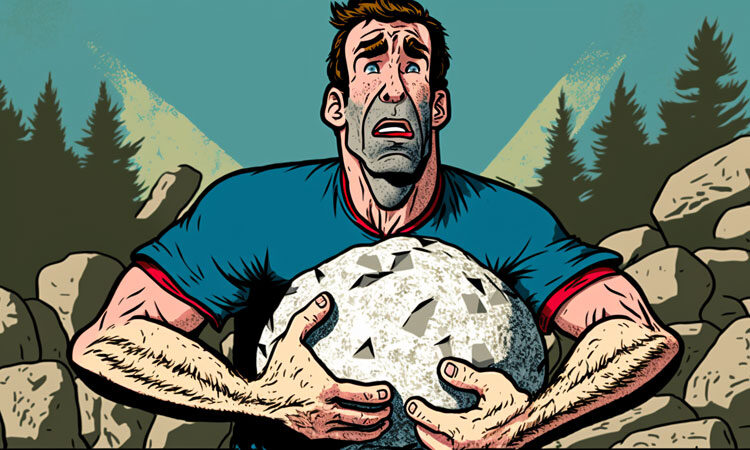Once upon a time there was a man who lived in a village. Every morning, this man would pick up the same large rock and carry it over to the village square. At the square, this man would stand for hours, silently holding the rock. If the man had a name, nobody seemed to remember what it was: for the longest time, the people in the village simply referred to him as “Rockman.”
At first, some of the villagers took pity on Rockman. But eventually, the local people became used to the site of him and simply ignored him. Practically speaking, hardly anyone even noticed him anymore.
The fact that he was ignored did nothing to resolve Rockman’s pain. In fact, the emotional pain was even worse than the physical pain. “How can everyone simply ignore me,” raged Rockman. “Doesn’t anybody care?!” Despite the injustice of not being seen, Rockman continued to bear his pain, each and every day.
One day while Rockman was holding the rock, he had a strange feeling that something was different. Looking up, he realized that an old man was staring at him. He had never seen this person before, and being stared at by this stranger started to make him uncomfortable.
Rockman diverted his gaze to ground, hoping this old man would go away. But each time that Rockman looked up, the man was still there. And he was staring straight at Rockman.
“This is intolerable!” Rockman wailed to himself. “How can this man simply stare at me like this? Why won’t he just leave me alone?”
As the day moved on, Rockman became increasingly bothered by the old man’s gaze. Not knowing what to do, Rockman decided to stare back. But as he did so, he noticed the corners of the old man’s mouth move upwards. Rockman wasn’t sure, but it looked like the old man was grinning at him!
“I can’t believe this!” thought Rockman. “I think this man may be laughing at me.” And to Rockman’s amazement, the old man – while still staring straight at Rockman – did indeed start to laugh.
For some reason, Rockman felt himself start to get very hot. His hands were sweating, and it was becoming harder to hold up the stone. Rockman himself was getting angrier, but this was not helping him in the least. The angrier he become, the more sweat he produced. Soon, sweat was pouring down his face, arms, and hands. But the old man continued to laugh.
Finally, Rockman could not hold onto the rock any longer, and it slipped out of his grip. Rockman was furious. “What on earth do you think you are doing!” shouted Rockman as he approached the old man. “Don’t you understand that I have to hold that rock?”
“If you must hold the rock, then why aren’t you holding it now?” inquired the old man.
“Because you made me drop it!” howled Rockman.
“And how do you feel now that you are no longer holding that burden?”
“I’m angry of course!” shouted Rockman. “That is my rock to carry; nobody can hold it but me. Don’t you see? I am Rockman. I’ve been holding that rock for many years. If I were to stop carrying that rock, then I am literally nobody!”
“That is not quite true,” replied the old man gently. “It’s true that you would no longer be Rockman. But if you stop holding that stone,” continued the man, with a twinkle in his eye, “you will become the man who put down the rock.”
Conclusion:
When we don’t let go of our emotional burdens, we will eventually become attached to them. This results in giving ourselves labels such as “the unappreciated spouse,” “the failure,” and “the person who can never catch a break.” If we identify with these labels long enough, we lose our sense of who we truly are. As a result, we are now afraid to let go of our pain, as this will mean letting go of our (false) identities.
Although it is scary to let go of these labels, the pain of not letting go is worse. As long as we hold onto these emotional burdens, we cannot move forward with life in a productive manner. Additionally, the experience of overcoming our fears and letting go our our emotional burdens will often result in a new life purpose of being the inspiration for others to do the same.
The old man wasn’t a wise person simply because he was old. He was wise because he himself had once experienced the same pain as Rockman and was able to overcome it. He therefore knew that the answer was not to criticize or ignore Rockman, but instead to support Rockman in his personal transformation, without judgement or unsolicited advice.

